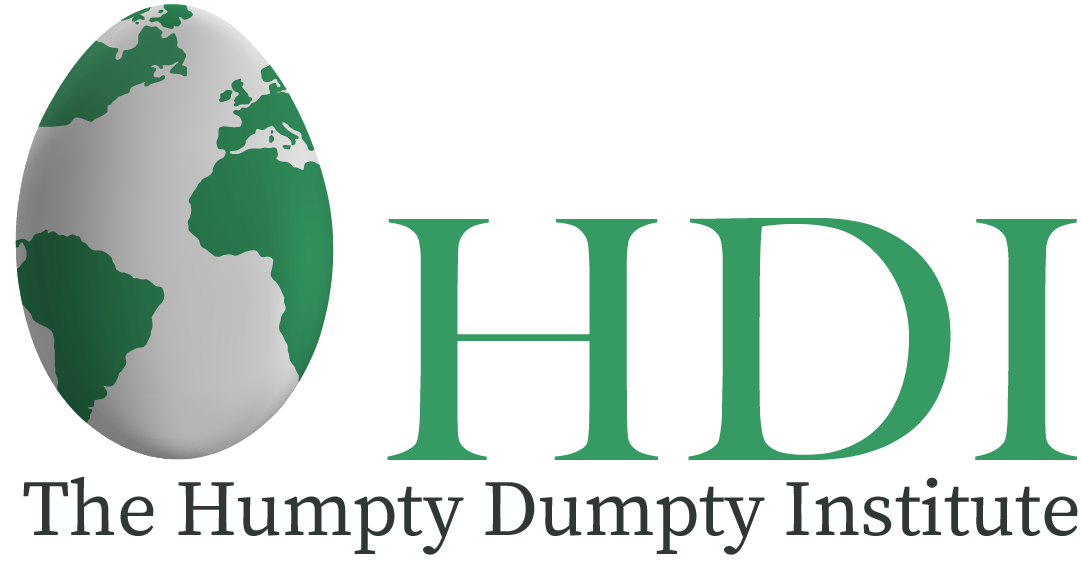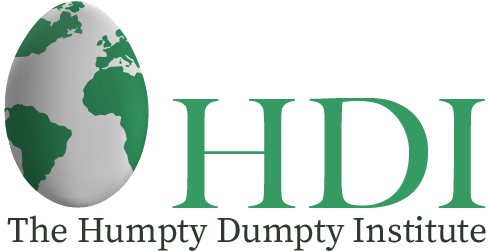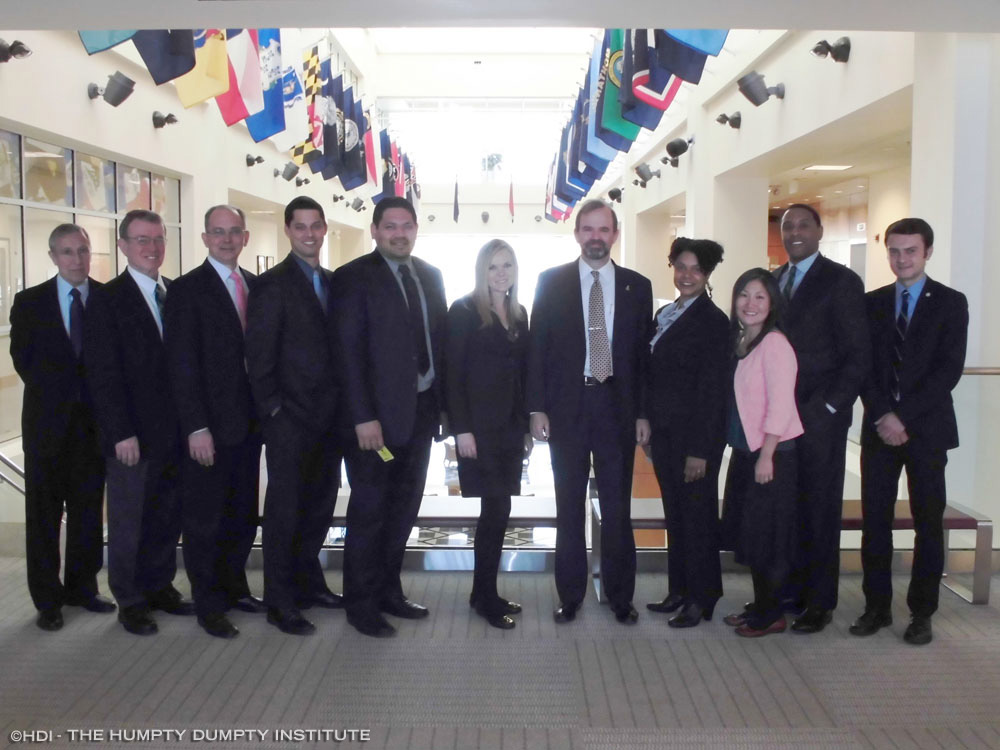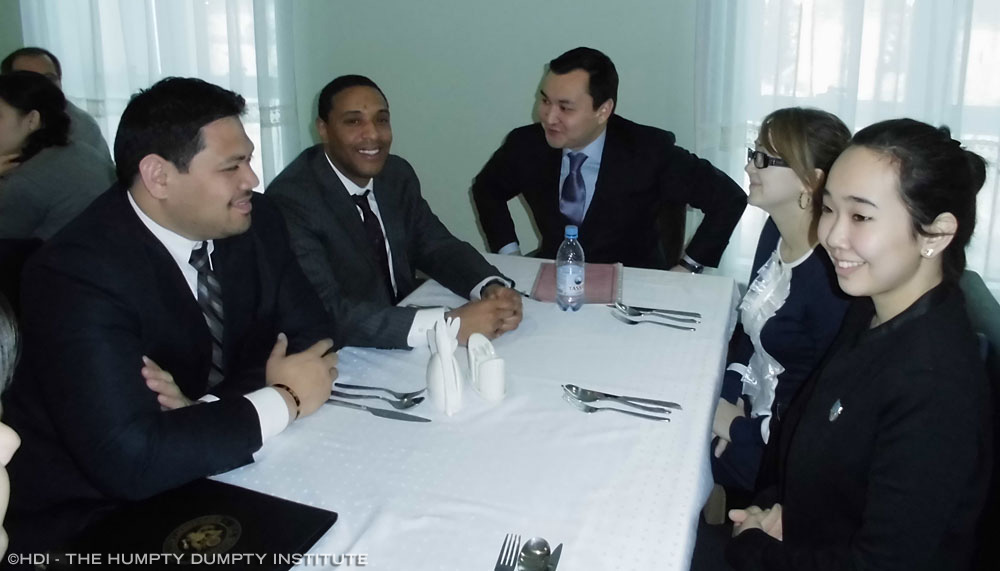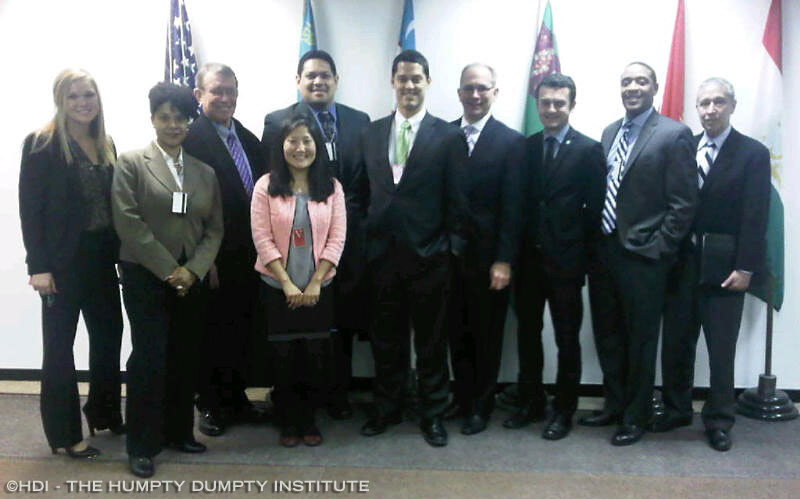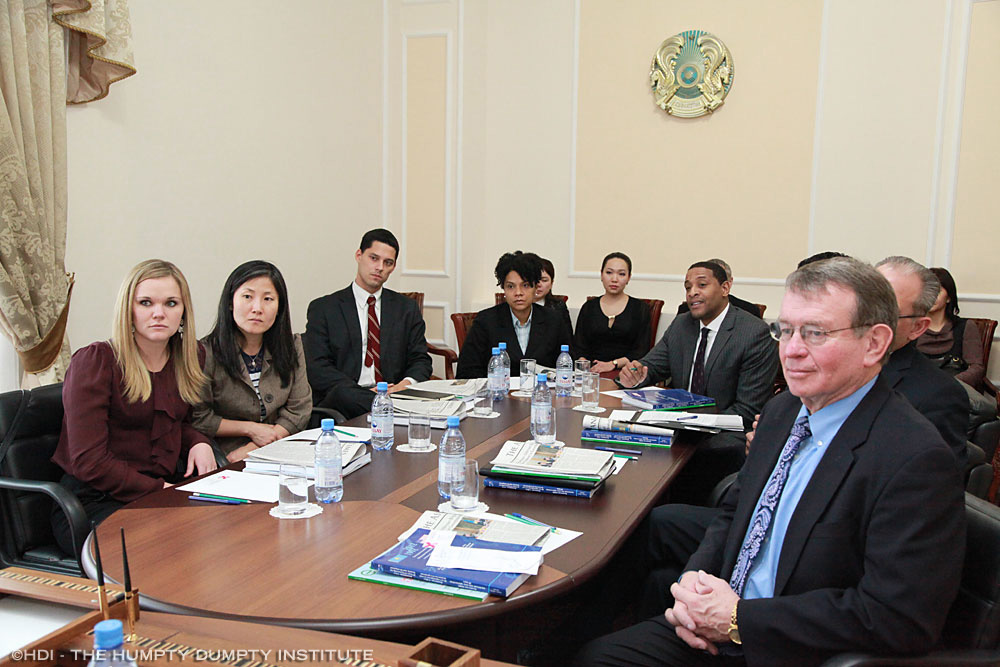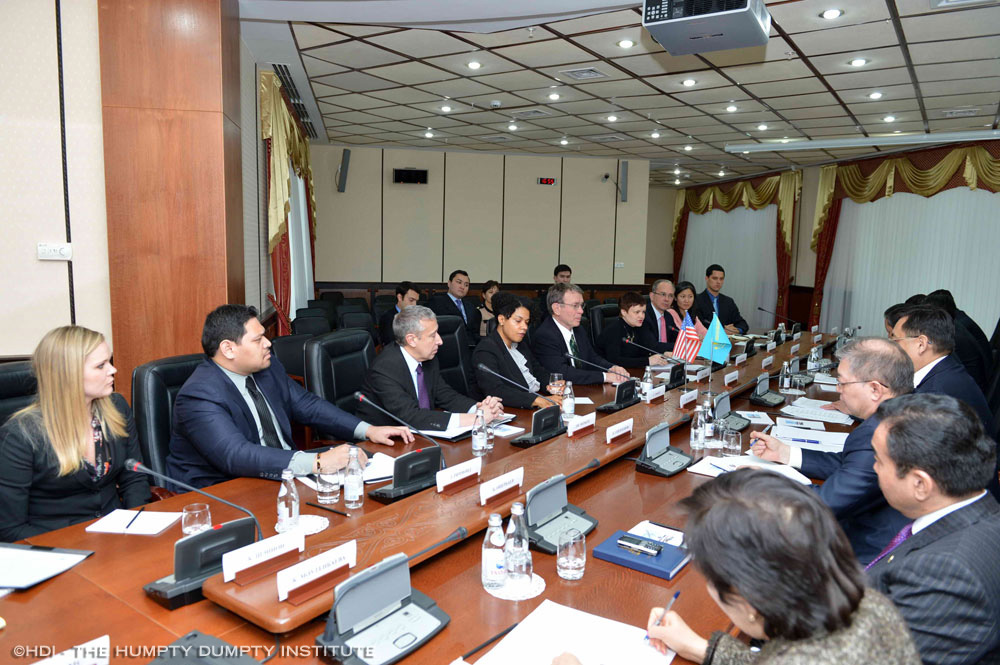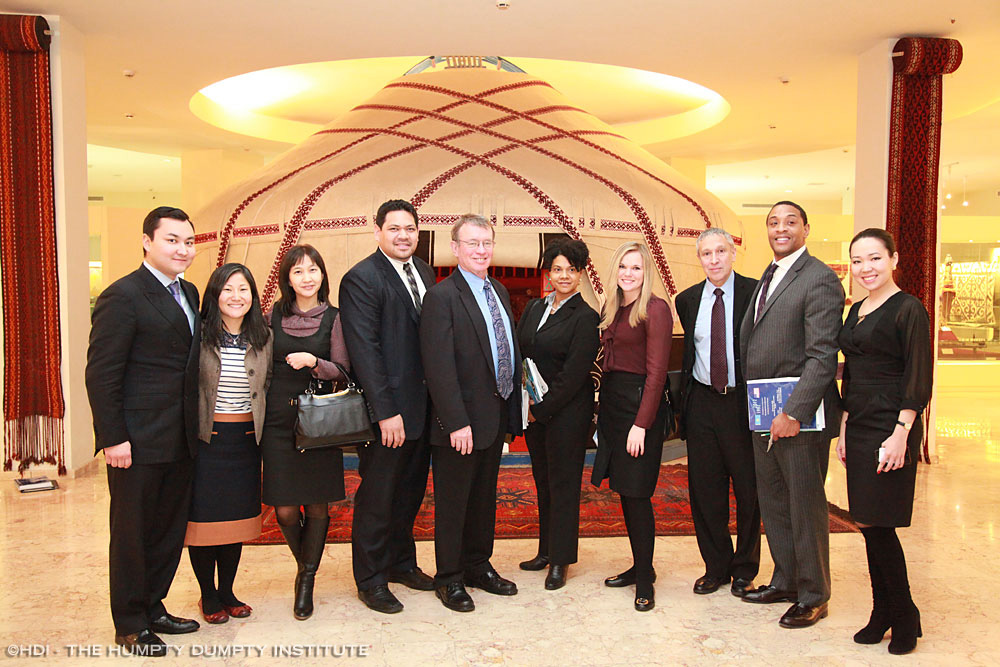February 27, 2013 – On Friday, January 25, the Humpty Dumpty Institute (HDI) departed Washington, D.C. on a Congressional Staff Delegation to Almaty and Astana, Republic of Kazakhstan. The trip took place under the auspices of the Mutual Educational and Cultural Affairs Act (MECEA) agreement between the United States and the Republic of Kazakhstan. MECEA agreements are intended to familiarize Members of Congress and Staff with the culture, history and politics of the signatory countries. The focus of this trip was finance and trade issues in the Republic of Kazakhstan, Kazakhstan’s upcoming ascension to the World Trade Organization (WTO), and the importance of strong U.S./Kazakhstan ties. The delegation met with senior-level Kazakh policy makers, the business community, and leaders in the area of politics, economics, and culture.
The delegation arrived in Almaty on the morning of Sunday, January 27, and had an organizational brunch at the hotel. The cultural program began that afternoon with a guided tour of Almaty. The participants were introduced to the classical Russian, Kazakh and Soviet style architecture built in the background of the scenic Tian Shan mountain range. The sightseeing tour of the ex-capital of Kazakhstan was followed by a visit to the Kazakh State Academic Opera and Ballet House-Abay Opera House where the participants watched a performance of Swan Lake. The first day was concluded with a traditional Kazakh meal at a local restaurant.
On Monday, January 28, the delegation received a briefing at the U.S. Consulate in Almaty. Justin Kimmons-Gilbert gave the group a general overview of the Consulate’s mission in Almaty. The participants also spoke with USAID representatives on issues affecting economic growth and development in the country. Representatives of the U.S. Department of Commerce and U.S. Commercial Services gave their perspective on American business presence in the region. The discussion highlighted the Kazakh government’s increasing commitment to transparency in financial services, ongoing reforms in various Ministries to streamline business cooperation and trade, and impact of foreign investment from neighboring Russia and China compared to that of the U.S. The Consulate experts concluded that Kazakhstan is expanding its role as a center for regional and global trade and logistics, and that the U.S. support and cooperation in these areas was strategically important on a bilateral level. The next meeting was with the American Chamber of Commerce in Kazakhstan. U.S. business representatives from various spheres such as oil and gas, transportation, agriculture, natural resources, etc. were present to give their view on operating a business in Kazakhstan. The participants learned of the progress the government has made to increase foreign investment and also heard of the multiple challenges still ahead. The following meeting was with the DAMU Entrepreneurship Development Fund. DAMU is a government sponsored institution that provides financial and developmental support to small and medium level businesses in Kazakhstan. The Fund is responsible for loans, subsidies and business education in all industries of the economy. Next stop was the Al-Farabi Kazakh National University which included a tour of the facilities, meeting with students and faculty, and a lunch at the dining facility. KazNU, as it is often referred to, is the largest university in Kazakhstan established in 1933. KazNU has an outstanding program called “Global Classroom” in which it partners with 23 international universities including Columbia University (NY). This program allows students of various participating schools to engage in an exchange of knowledge and ideas on a wide range of topics including sustainable development, climate change, human rights, etc. Staff and faculty answered participants’ questions during lunch at the KazNU dining facility. This created a platform for further dialogue and cooperation. After this visit, the delegation traveled to Astana, the capital of Kazakhstan.
On Tuesday, January 29, the participants had the pleasure to visit the largest mosque in Central Asia, the Nur-Astana Mosque. The group was then briefed by U.S. Ambassador Kenneth J. Fairfax on developments in the U.S./Kazakhstan bilateral relationship and programs designed to increase trade as well as cultural and educational exchanges. The Ambassador commended the Kazakh government’s extensive involvement in nuclear disarmament and stressed the importance of robust U.S./Kazakhstan engagement to promote regional stability. Ambassador Fairfax pointed out the positive changes in legislation affecting finance and trade and how the Kazakh government is taking steps to address the flaws of the current system. Expanding on the regional stability topic, the Ambassador noted Kazakhstan’s support to U.S. development efforts in Afghanistan through educational programs for Afghan students, and investment in infrastructure such as clinics and schools. The next meeting was with representatives of the Kazakhstan Chamber of Commerce in Astana. The Chamber services Kazakh businesses via business development programs, legal support and consulting services. The Chamber representatives reiterated that the ongoing legislative reforms are benefiting local businesses and provide incentives for future success. The group then visited the Parliament of Kazakhstan and had meetings with both Majilis (House) and Senate sides. The parliamentarians highlighted the importance of cooperation between the governments of the Republic of Kazakhstan and the United States and praised ongoing support from the U.S. since independence in 1991. The participants learned about the planned schedule for the 2013 parliamentary session, and received an overview of the structure of the Kazakh Parliament. Senator Sydykov, Deputy Chief of Staff of the Senate, briefed the delegation on the recent adoption of a series of laws that are being implemented in areas of finance and trade for compliance with international standards as a step towards Kazakhstan’s accession into the WTO. The Senate also pointed the implementation of the G-Global project as an alternative to the G-8 and G-20. G-Global is world anti-crisis forum for international discussion of global economic issues that takes place during the Astana Economic Forum and produces a series of policy recommendations for the United Nations and G-20. The Senators proposed further cooperation between Kazakhstan and the United States on a world food security program that brings together U.S. technological advancement and Kazakhstan’s vast available territory in creating a world food bank. Before dinner, the participants had the opportunity to visit the Bayterek Tower.
On Wednesday, January 30, the participants met with Ms. Aray Kassabekova, Deputy Director of Center for Trade Policy Development. Ms. Kassabekova discussed the structure of the Kazakh economic system and planned future developments from the government perspective. She stressed the Kazakh government’s commitment to treating all investors and business equally and, as a sign of such commitment, she highlighted the recent reforms in the finance and trade sector. Along with adhering to international standards, these and future reforms will promote transparency in tax and fee regulations which will allow businesses to develop and sustain their positive impact on local, regional and global economies. After the meeting, the delegation visited Nazarbayev University and met with students. Nazarbayev University is a unique English language public university which prepares graduates for careers in international trade, commerce, and diplomacy. After touring the facilities, the participants discussed with students over a working lunch the future of mutual cooperation between American and Kazakh higher education institutions. The next meeting was at the renowned Nazarbayev Center with the Deputy Director, Mr. Roman Vassilenko. Mr. Vassilenko briefed the group on the work of the Center as a multifunctional research and educational public institution which seeks to promote international cooperation in the political, social and humanitarian sectors. The Center also acts a museum and the participants received a guided tour. The final meeting of the program was with the Vice Minister of Industry and New Technologies, Mr. Kanysh Tuleushyn, who outlined the various sectors of industry that the Ministry actively works with in promoting sustainable technologies and innovations. The Vice Minister pointed out that the increase in investment and success of new businesses creates healthy competition and guides industry towards new technological advancement. He also pointed out the expansion of the tourism sector with various resort projects across the country that together with other sustainable development projects is helping Kazakhstan become less dependent on its natural resource reserves.
Participants:
John Sandy – Chief of Staff, Senator James E. Risch(R-ID)
Sophia Lafargue – Chief of Staff, Representative Gregory Meeks (D-NY)
Jason Cole – Chief of Staff, Representative Jim Himes (D-CT)
David Richmond – Legislative Director, Representative Eni Faleomavaega (D-AS)
Caitlin Shannon – Legislative Assistant, Representative Devin Nunes (R-CA)
Jason Lemons – Legislative Assistant, Representative Jim McDermott (D-WA)
Kyle Williams – Legislative Assistant, Representative Marcia Fudge (D-OH)
Helen Chung – APAICS Fellow, Representative Mike Honda (D-CA)
For more information, please contact Boris Shapoval boris.shapoval@thehdi.org
All The Humpty Dumpty Institute organized Congressional travel is approved by the Ethics Offices of the U.S. House and the U.S. Senate and follow all guidelines for travel by USG employees as prescribed by U.S. Department of State regulations.
